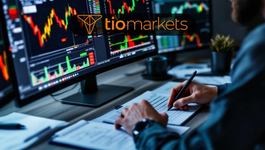Trading vs Investing: Key Differences Explained | TIOmarkets
BY TIOmarkets
|June 12, 2024In the financial world, the terms "trading" and "investing" are often used interchangeably, yet they embody fundamentally different approaches to the market. Understanding these differences is crucial for anyone looking to navigate the complexities of financial markets effectively. This article aims to demystify the key distinctions between trading and investing, providing a clear and concise overview to help you make informed decisions.
Definition and Time Horizon
The core difference between trading and investing lies in the time horizon and the ultimate goal of each strategy. Let's delve into the specifics.
What is Trading?
Trading involves the frequent buying and selling of financial instruments such as stocks, bonds, or commodities with the aim of generating returns that outperform buy-and-hold investing. Traders focus on market movements, technical analysis, and short-term price fluctuations to make profits over days, weeks, or months.
What is Investing?
Investing, on the other hand, is the process of buying and holding assets for the long term. Investors typically seek to build wealth gradually through the compounding of earnings, dividends, and capital gains. The investment horizon can span years or even decades, with a focus on the fundamental value of the assets and their potential for long-term growth.
Approach and Strategy
While both traders and investors aim to make money in the financial markets, their approaches and strategies differ significantly.
Trading Strategies
Traders employ a variety of strategies based on technical analysis, chart patterns, and market trends. Common trading styles include day trading, swing trading, and scalping, each with its own set of rules and techniques for capitalizing on short-term market movements.
Investing Strategies
Investors focus on fundamental analysis, seeking to identify undervalued assets with strong growth prospects. Long-term investing strategies may involve diversification, dollar-cost averaging, and a focus on sectors or companies with solid fundamentals. The goal is to build a portfolio that grows in value over time through careful selection and patience.
Risk and Return
The potential risk and return profiles of trading and investing vary, reflecting the differences in strategy and time horizon.
Risk Considerations
Trading is generally considered riskier than investing due to the short-term nature of the strategies and the higher frequency of transactions. The use of leverage is common in trading, which can amplify both gains and losses. Investors, by contrast, are exposed to market risk over longer periods but can mitigate these risks through diversification and a focus on quality assets.
Return Expectations
Traders often seek higher returns within shorter periods, which requires a more active management style and acceptance of higher volatility. Investors, while potentially experiencing lower volatility, aim for steady, compounding returns over the long term, aligning with the growth of the underlying assets.
Pros and Cons
Both trading and investing offer pathways to financial growth but come with their own sets of advantages and disadvantages.
Pros of Trading
- Flexibility: Traders can take advantage of both rising and falling markets.
- Potential for quick profits: Successful trades can result in immediate returns.
- High liquidity: Trading strategies often involve assets that can be easily bought and sold.
Cons of Trading
- Higher risk: Frequent trading and leverage can lead to significant losses.
- Increased costs: Transaction fees and taxes can erode profits.
- Requires constant monitoring: Trading demands a lot of time and attention to market movements.
Pros of Investing
- Compounding returns: Long-term investing allows earnings to generate their own earnings.
- Lower costs: Fewer transactions mean lower fees and taxes.
- Reduced stress: Investing requires less day-to-day management.
Cons of Investing
- Capital is tied up for longer periods, reducing liquidity.
- Requires patience: It can take years to see significant returns.
- Market risk: Long-term investments are still subject to market fluctuations.
Psychological Factors
Another critical aspect to consider when comparing trading and investing is the psychological impact on individuals.
Emotional Rollercoaster
Trading can be emotionally taxing due to the rapid decision-making required and the potential for quick gains or losses. Investors, on the other hand, may experience less emotional stress as they adopt a long-term perspective and are less affected by short-term market fluctuations.
Market Timing
Timing the market is a crucial factor that differentiates trading from investing.
Trading on Market Timing
Traders often rely on technical indicators and market signals to time their entries and exits, aiming to capitalize on short-term price movements. This requires a high level of precision and quick decision-making.
Investing without Market Timing
Investors, in contrast, focus less on market timing and more on the fundamental value of the assets they hold. By taking a long-term view, they aim to benefit from the overall growth of the market rather than trying to time individual trades.
Regulatory Considerations
Both trading and investing are subject to regulatory frameworks that govern financial markets.
Regulatory Oversight
Traders and investors alike must adhere to regulations set by governing bodies to ensure fair and transparent market practices. Understanding and complying with these regulations is essential for anyone participating in the financial markets.
Technology and Automation
Advancements in technology have significantly impacted both trading and investing practices.
Algorithmic Trading
Traders now have access to sophisticated algorithms that can execute trades at high speeds based on predefined criteria. This automation has revolutionized the trading landscape, enabling rapid decision-making and execution.
Robo-Advisors
For investors, robo-advisors offer automated portfolio management services based on algorithms and predetermined risk profiles. This technology has made investing more accessible to the general public and has streamlined the investment process.
In conclusion, whether you choose to trade or invest will depend on your financial goals, risk tolerance, and time horizon. Both approaches require a solid understanding of the markets and a disciplined strategy. By recognizing the key differences outlined in this article, you can better align your financial activities with your objectives, leading to more informed and potentially rewarding decisions in the financial markets.
Start Your Trading Journey with TIOmarkets
Now that you understand the key differences between trading and investing, it's time to put your knowledge into action. Join the 170,000+ traders in over 170 countries who have chosen TIOmarkets as their trusted forex broker. With our platform, you can trade over 300 instruments across 5 markets, including Forex, indices, stocks, commodities, and futures, all with low fees. Plus, enhance your trading skills with our comprehensive educational resources and step-by-step guides. Ready to embark on your trading adventure? Create a Trading Account today and be part of a top-rated online trading community.

Risk disclaimer: CFDs are complex instruments and come with a high risk of losing money rapidly due to leverage. You should consider whether you understand how CFDs work and whether you can afford to take the high risk of losing your money. Never deposit more than you are prepared to lose. Professional client’s losses can exceed their deposit. Please see our risk warning policy and seek independent professional advice if you do not fully understand. This information is not directed or intended for distribution to or use by residents of certain countries/jurisdictions including, but not limited to, USA & OFAC. The Company holds the right to alter the aforementioned list of countries at its own discretion.
Join us on social media

Behind every blog post lies the combined experience of the people working at TIOmarkets. We are a team of dedicated industry professionals and financial markets enthusiasts committed to providing you with trading education and financial markets commentary. Our goal is to help empower you with the knowledge you need to trade in the markets effectively.
Related Posts





